Monday, January 30, 2023
A tale of two Januaries
Sunday, January 29, 2023
A PLE primer: why the Uganda national exams matter, and Bundibugyo results
On Friday, Uganda released the results of the Primary Leaving Examination (PLE). Uganda's school system has 7 grades of Primary School, P1 to P7, and then students sit for a national examination in four subjects: math, English, social studies, and science.
- About 830,000 students finish primary and sit for the PLE exam to qualify for secondary school.
- 350,000 students were secondary finishers in 2022 (O level, "Uganda Certificate of Education" UCE, taken after Senior 1 to Senior 4, 4 years of general education in at least 8 subjects, approximately American grades 8-11) and
- a bit under 100,000 finished advanced secondary (A level, "Uganda Advanced Certificate of Education" UACE, taken after Senior 5 and 6, two years narrowed to 3-4 subjects, approximately American senior High School/junior college level). This qualifies them for Certificate, Diploma, or Degree programs in trade schools or Universities.
Friday, December 30, 2022
December 30th connecting West Virginia and Western Uganda in hope of glory in spite of logic
88 years ago today, my grandmother gave birth to her 15th and last child, my father. She had her first daughter in her late teens and my dad when she was in her early 40’s, and I am certainly glad she poured herself into her family in ways that few would think makes sense now. As we watched the World Cup final, the commentator described the come-back turn-around play as “illogically glorious”, a phrase that beautifully describes life (and anyone who gets Laura Marty’s updates saw that it resonated with her too!). A couple who lived on the edge of poverty and already has 14 children would not seem to be making a logical choice for one more. And yet, 88 years later, we can see some of the glory that followed. My dad lived 71 years as a faithful, generous, wise, loyal, steady, ready-with-laughter, firm presence in our family’s life and this world, blessing hundreds and thousands of others.
Christmas is an illogically glorious celebration of a birth on the other end of the fertility spectrum, not the 15th to a mom over 40 but the first to a mom under 20, unmarried, unhoused by politics and decrees, in an occupied territory and chased after the delivery by terrorising soldiers. “Let it be to me”, Mary said, when the scandalous, dangerous inconvenience of a pregnancy was announced to her. She believed in the glory to be revealed, long before there was any logical evidence of it. She believed in the illogical, mysterious connection between her infant and the limitless power of the God of all creation. In the possibility unleashed by the presence of divinity and humanity melded, the reversal of entropy into all-things-new life.
As 2022 draws near to closing, we are grateful to be following the illogically glorious footsteps of that same baby and that same story. Christmas spent on a different continent than most of our kids and both our moms, in a community tenuously vulnerable to rebel incursion (the ADF causing troubles again), hosting refugees from Congo (grateful to Forests for arranging connection and response), juggling pandemics (Ebola finally settling to zero, but COVID and malaria and a thousand others still bringing sorrows), struggling to provide for their families (the desperation of poverty has been so evident in this month as our team receives request after request for assistance). We’ve been up to our necks in end of year budget shortfalls and changes, in new required compliance with new Ugandan tax laws, in sorting out contracts for Christ School and World Harvest Mission where we push for just raises without knowing how God will provide the cash (about 60 employees, so it’s important!). Around our Area we have teams visiting in the hospitals, carolling in villages, agonising over language or schooling decisions for kids, planning cross-cultural festivities. None of us are globally remarkable, and yet . . . glory shines, if we have eyes to notice it.
As we turn to 2023, that’s on our hearts. May we have eyes to notice the subtle incarnation, the glory in the unexpected, hidden, illogical corners of our world. God’s presence 2000+ years ago came with clues for those who were looking, but always a choice to attend to it or not. Incarnation is ignorable. The hard losses and miseries of this world seem much easier to notice . . . but when we look, we see the hungry fed and the the lonely enfolded into families and the kids on the margins receive door-opening educations and the persecuted rescued. My dad was a person who could see the good in spite of the struggle, and gave generously throughout his life and beyond it. If you received our paper Christmas letter, check the needs there or follow the links here or in the sidebar to BundiNutrition and Christ School Bundibugyo or the Myhre fund if you have end-of-year giving that you want to direct into the illogical glory of small thing transforming the world.
Sunday, December 18, 2022
Wounds that Heal, pouring out the soul, and Advent week 4
After a LOT of hopeful Isaiah build up to the coming promised one as light, a descendent of the the best king ever, a shepherd who seeks out the wandering and makes a road through the wilderness, a righter of wrongs . . . chapter 53 must have slammed into expectations pretty jarringly. Because the glorious one we are holding on to see is presented there as an unattractive, weak, victimised person. Even lambs for the sacrifice sound too fluffy and pure for the describers in chapter 53. The messiah would not be a winner. He would not be a superhero. He would be scarred and depleted and killed.
The followers in the first century didn't get this any better than we do. Perhaps Mary and Joseph began to grasp the very dangerous outsider path they had entered when they were homeless for giving birth, and fleeing from murderous soldiers.
But Isaiah 53's lamb's wounds are not punitive. They are restorative. The one who comes and pours out His soul does so with cosmic consequence, the beginning of a reversal of all that is harmful, painful, sad, wrong, despairing. His suffering is our healing.
This Advent season, as all Advent seasons, that is good news. The ADF attacked Ntoroko crossing the Semliki river about 50km north of us, a group of 40-ish rebels, on Tuesday. The Ugandan army responded quickly and definitively and we're already back to calm, but a stark reminder of the stakes of warfare all around us. A day later a family came to describe the life-threatening birth disabilities of their newly born baby and we went to examine him, pray, and refer him for emergency surgery at one of the two medical centers in the country that can handle it. That evening we got a threatening letter from the lawyers representing the family that unjustly reclaimed land the mission bought decades ago. Every day desperate people are asking for money for preparing for Christmas. Insecurity, illness, injustice, poverty . . . these four hardships are not just words, they are the fabric of everyday life all around us.
Into that world, the lamb who was despised and rejected and killed but in the process re-set the path of the universe to all-things-new . . . is good news indeed. Something worth watching for, Advent and always.
And as we are left to keep slogging through the already-but-not-yet of His having come but still to come and bring this process to completion . . . nothing brings us more Christmas hope than a visit from one of our kids. So I'll throw in a few photos this week that point to the very healing that Christmas begins, the making right of all the separation and sorrow of the world!
Saturday, December 10, 2022
Righting the wrongs and bringing us home: Advent week 3
From the 700 year old prophecies of Isaiah to the birth-night proclamations of angels, "do not be afraid" seems to be one of the primary messages we need to hear. Given smouldering lethal virae and intractable conflicts and sorrowful losses all around us, it DOES seem to be a message that bears repeating. Along with, do not give up. It's been one of those stretches so far in December where the world weighs heavily.
But what strikes me most about these fear-not messages is that I want the dependent phrase to be a reassuring explanation of "don't be afraid because nothing bad will happen, this won't hurt, you won't suffer, you're safe". But almost every time, in the subsequent phrase the only reassurance given is "for I am with you, you are mine, I'm in this story."
We need to hear that.
Our team is studying Isaiah, and a major theme is that God's presence is a reckoning, a judgement, a righting of all that is wrong. That's what Mary celebrated in her magnificat, the poem declaring that her child would actively topple the powers that be, the oppressive system that marred their lives. Which Isaiah points to too: the blind will see, the tears will be dried, death will be no more (chapter 35 for instance). A deep change in the universe that results in some immediate visible evidences but also sets in motion a transformation yet to be seen. Some of that happened in communities in occupied Palestine during Jesus' life, as a result of his presence. I know that God passionately wants to heal the world but from my human perspective, I have to imagine that Jesus in the flesh personally threatened by Herod's soldiers, personally fleeing from danger to Egypt, personally working to feed the family, personally asked by the blind and lame to fix their problems, must have felt compelled on a new level. After Lazarus died, he wept. There's no substitute for incarnation in seeing the wrong and feeling it and personally wanting to make it right, which is the essence of our chosen life. Many organisations send money, send experts for a week or a month, establish parameters for a project. And we see the good of those things, this week for instance the way that has driven maternal and neonatal death reviews that generates data and awareness. But being personally present, knowing the particular pregnant mother and her dreams and fears because we live here, that's the Serge path that we walk . . .
Which to be honest has been a doozy this December.
To embrace the value of reckoning, you have to be immersed in the reality of not-right, to live at the unraveling fray. In the last few hours, an acquaintance whose wife died of a chronic terminal disease, a friend we've worked with closely now weeping because her daughter was not promoted to the next class of the school she wants to attend in spite of passing grades (everyone did so well that her decent results still put her near the bottom) leaving this family with few options, another very old friend here with a major financial ask for his kid's educational support, another with a devastating eye injury from a fight that broke out at a burial, another being chased off the family land. All people we've known for years, decades even. It's been a couple of weeks of pummelling sorrows. They sound hard when typed out; knowing the people and confronting the wrongs face to face is even heavier. And our little dog, Nyota, who followed us on a run six years ago as a lost puppy in Kenya, died Sunday night. She'd been dwindling from causes unknown, and didn't respond to treatments the local vet and we all tried. Minor compared to the human consequences of disintegrating creation, but a grief nonetheless. And as leaders, we have also had to carry the hard choices of balancing budgets, determining salaries, anticipating taxes, wrestling through murky systems, deciding on limits that disappoint and hurt people we care about. And the heft of all the above is happening within a few miles, so when added to the hard choices and sacrifices of our entire Area of workers in Serge ... we feel our powerlessness to fix just about anything.
Advent in Bundibugyo makes the longing for the wrongs to be put right starkly center-stage. Every hard story makes that longing sharper, and the proximity and duration of living in the mess shatters any illusion that it's a bit removed or that it's solvable by us. We need the Messiah to finish what He started, to lay waste to evil . . . and to transform the wasteland into a garden.
Because the reckoning is just the beginning of the promised work. The all-things-new that we wait for is actually a homecoming. The imagery of the highway in Isaiah 35 implies it is going somewhere. It is going home. Advent leads to Christmas. The wrongs put right are not just a means of making the world more orderly, it's a process of making the world more homey. Redeeming the creation--including us--into a place of beauty and thriving. I think that's what twinkle lights and greenery and colourful ornaments preview. A home we are invited to return to that is where we truly want to live.
Home is a complex concept for many of us, straddling places and interlocking circles of families, always leaving something out until the final promises of Revelation 21 come true. As hard and sad as the last two weeks have been, they also make the promise of home one that we want to draw people into here and now, and one that we want to cling to for ourselves. Only one of our five can come home to Bundi this Christmas, but we can't wait to pick him up in less than 48 hours now at the airport. And this week I found my heart deeply thankful that the other four could be together, which truly seemed more comforting and important than any more of them coming here. Also super thankful that both of our sisters manage once again to enfold our moms into their family celebrations, since we can't this year. And that we can keep our hearts and doors open to team family who miss theirs.
Wrongs made right, and the road to home. These are two of the lenses for understanding the Christmas story, given by Isaiah, celebrated in the Gospels, and treasured here in 21rst century East/Central Africa.
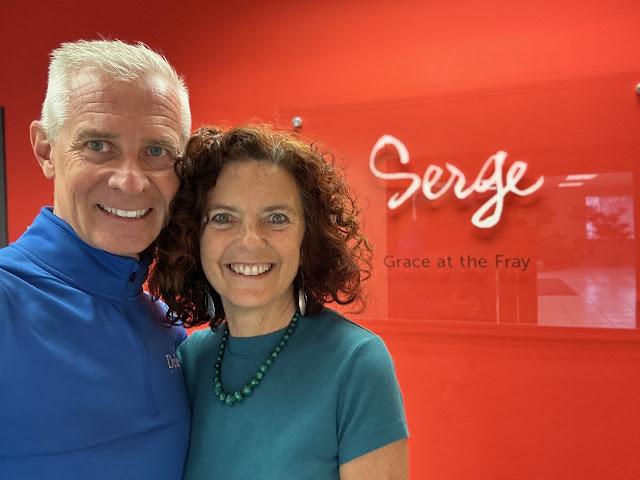
.jpeg)



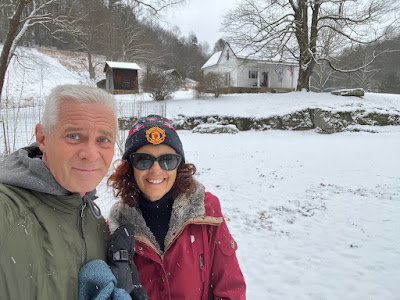
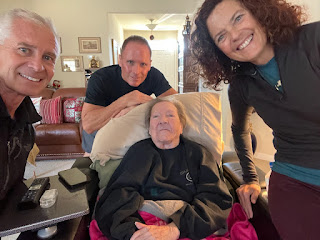


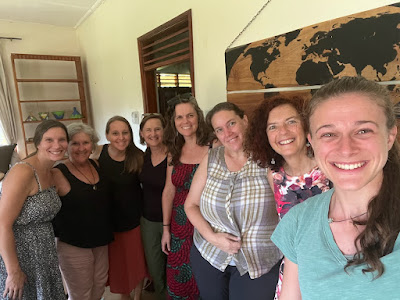








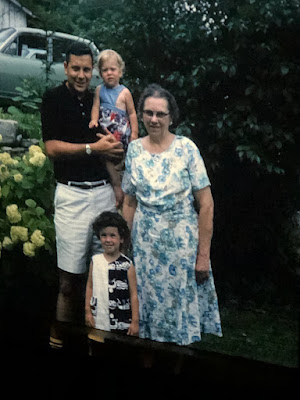

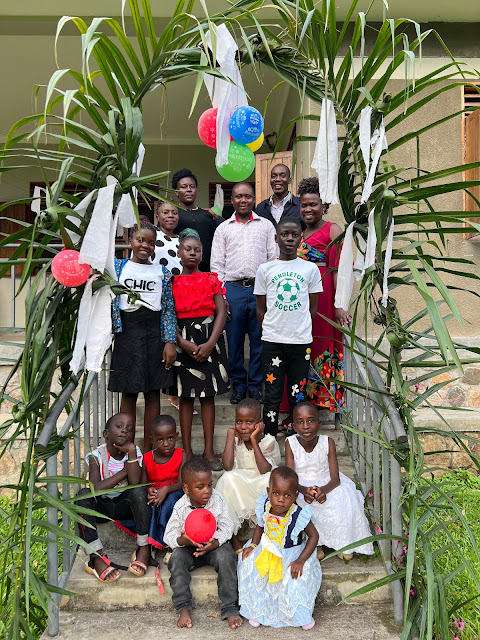
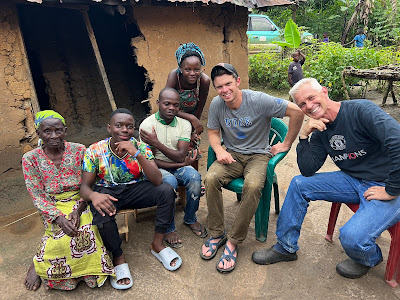




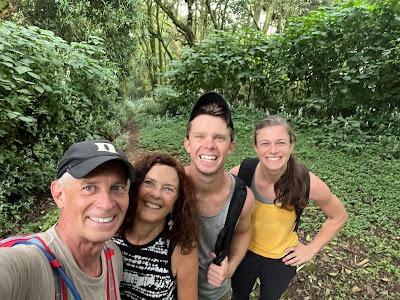







.jpeg)






.jpeg)
.jpeg)








